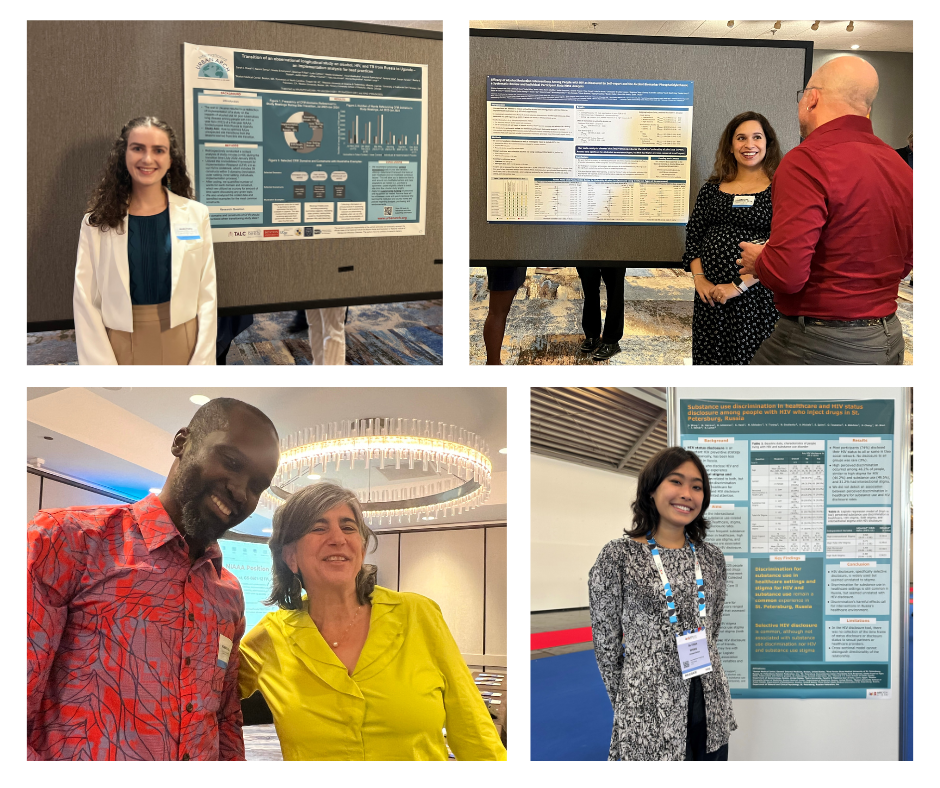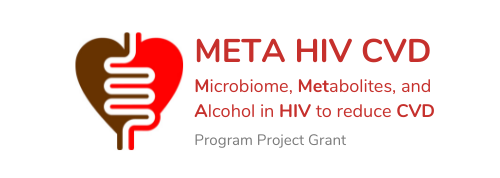Check out the current issue of URBAN ARCH News, the quarterly newsletter bringing you news on the latest URBAN ARCH and related research.
URBAN ARCH at Summer 2024 Conferences
In this edition of the URBAN ARCH Newsletter, we highlight URBAN ARCH involvement at Summer 2024 conferences.
Click on the buttons below to see what the International URBAN ARCH Center Cores and Projects have been working on.
Spotlight on… Patrick Agumenaitwe and Adah Tumwegamire
 In this issue, we learn more about Patrick Agumenaitwe, data manager for the TALC and GRAIL studies, and Adah Tumwegamire, data manager for the TRAC study.
In this issue, we learn more about Patrick Agumenaitwe, data manager for the TALC and GRAIL studies, and Adah Tumwegamire, data manager for the TRAC study.
Article Spotlight
Do Financial Incentives Decrease Unhealthy Alcohol Use and Increase Isoniazid Adherence for TB Prevention Among People With HIV in Uganda?
Unhealthy alcohol use is a risk factor for tuberculosis (TB) and is associated with decreased adherence to isoniazid preventive therapy (IPT) and may increase risk for hepatotoxicity to IPT. Financial incentive-based interventions, especially contingency-management (CM) interventions, that reward short-term behavior change are highly effective for substance use disorders and other behaviors. Researchers in Uganda investigated whether financial incentives would reduce alcohol use and increase IPT adherence among a cohort of people with HIV, unhealthy alcohol use,* and latent TB who were initiating six months of IPT. Participants (N=680) were randomized to one of four groups: 1) no incentives (n=169); 2) incentives for alcohol abstinence (n=169); 3) incentives for IPT adherence (n=170); or 4) incentives for both alcohol abstinence and IPT adherence (n=172). Participants in groups two and four received escalating incentives for monthly urine tests that were negative for an alcohol biomarker indicating recent use (ethyl glucuronide); those in groups three and four received escalating incentives for monthly urine tests that were positive for an isoniazid biomarker. Alcohol use was also assessed quarterly via self-report (AUDIT-C) and the alcohol biomarker phoshatidylethanol (PEth), and IPT adherence was assessed via electronic pill bottle cap openings. The main findings were:
- Participants receiving incentives for alcohol abstinence were more likely to have non-hazardous alcohol use (defined as AUDIT-C negative and PEth <35 ng/mL at 3- and 6- months), compared with those not receiving alcohol incentives (18 percent versus 10 percent, respectively; adjusted risk difference [aRD], 8 percent).
- Participants receiving incentives for IPT adherence did not have increased adherence, compared with those not receiving IPT incentives.
- Overall, 8 percent of participants discontinued IPT due to serious adverse events.
* Defined as a positive Alcohol Use Disorders Identification Test-Consumption (AUDIT-C; ≥3 for women, ≥4 for men) for alcohol consumption in the last three months and positive for recent alcohol use on a rapid urine ethyl glucuronide dipstick test.
Comments: This economic incentive-based intervention was associated with decreased alcohol consumption, but not increased IPT adherence, in this cohort of people with HIV, latent TB, and unhealthy alcohol use in Uganda. Given that few, if any, prior studies have investigated the impact of financial incentives on alcohol use and IPT adherence among people with HIV in sub-Saharan Africa, future research should build on this evidence to further investigate the efficacy of financial incentive-based interventions in similar populations.
Reference: Chamie G^, Hahn JA^, Kekibiina A, et al. Financial incentives for reduced alcohol use and increased isoniazid adherence during tuberculosis preventive therapy among people with HIV in Uganda: an open-label, factorial randomised controlled trial. Lancet Glob Health. 2023;11(12):e1899-e1910.
^Equally contributing first authors.
Latest News
 Congratulations to URBAN ARCH trainee Bulat Idrisov, recipient of a 2024 Addiction Health Services Research Early Career Investigator Award! Bulat’s research, supported by a pilot grant, examines the effectiveness of health care spending, and focuses on HIV, hepatitis C, and substance use care. He has an MD from Bashkir State Medical University and a Master of Science from Brandeis University. His work includes digital therapeutics and addiction care in Eastern Europe, and he has received the Fulbright Scholarship and the National Institute on Drug Abuse Research Fellowship. Award winners will receive recognition during the opening plenary of the 2024 AHSR Conference in San Francisco, CA on Wednesday, October 16, 2024 at 1:30 PM PT.
Congratulations to URBAN ARCH trainee Bulat Idrisov, recipient of a 2024 Addiction Health Services Research Early Career Investigator Award! Bulat’s research, supported by a pilot grant, examines the effectiveness of health care spending, and focuses on HIV, hepatitis C, and substance use care. He has an MD from Bashkir State Medical University and a Master of Science from Brandeis University. His work includes digital therapeutics and addiction care in Eastern Europe, and he has received the Fulbright Scholarship and the National Institute on Drug Abuse Research Fellowship. Award winners will receive recognition during the opening plenary of the 2024 AHSR Conference in San Francisco, CA on Wednesday, October 16, 2024 at 1:30 PM PT.
New URBAN ARCH Publications
- Asiimwe SB, Kekibiina A, Woolf-King SE, Fatch R, Emenyonu N, Hahn JA. Alcohol Consumption Among Persons Living with HIV: Perceptions, Messages and Interventions-A Qualitative Study at an HIV Treatment Clinic in South Western Uganda. AIDS Behav. 2024 Aug;28(8):2559-2576.
- Idrisov B, Van Draanen J, Lodi S, Lunze K, Kimmel SD, Quinn EK, Truong V, Blokhina E, Gnatienko N, Krupitsky E, Samet JH, Williams EC. Socioeconomic Status and CD4 Count Among People with HIV Who Inject Drugs in St. Petersburg, Russia. AIDS Behav. 2024 Jul;28(7):2239-2246.
Events and Conferences
- International Society for Biomedical Research on Alcoholism (ISBRA): September 23-26, 2024; Melbourne, Australia.
Upcoming abstract submission deadlines: CROI (October 1, 2024)
Click here for more events and conferences.




